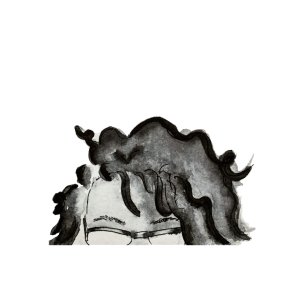This review may contain spoilers
Colouring oppression pink doesn't make it go away
I'm just going to make a review because this drama was sponsored by the Korean Ministry of Culture, Sports and Tourism, so this is a political message (even more than all other art that isn't directly sponsored by branches of government) that needs to be dissected so we understand where we're at and what's happening and what we can do with the information we're provided.
Branding and marketing are tools of capitalism to convince us to buy shit we don't need and clean the image of very dodgy people and businesses. So branding is about manipulating the truth and straight out lying and that's what they did with this drama to sell us South Korea as a place with wholesome business and work practices.
The South Korean president is a conservative right wing politician who has worsened the labour conditions for Koreans and foreigners working in South Korea. Companies are places of work, they're not families or kind and friendly. Selling that image tricks workers into thinking they're more than just numbers in a spreadsheet. Currently, they have a 52-hour workweek and the government wanted to increase it to 69 hours just last year. This year, they loosened the labour laws which has already resulted in the death of several workers, korean and foreign. Just last week there were news of a 19 year old who died on the job in South Korea. You can't sell bosses and CEO's as friendly and close to their workers when this is the reality of your work culture in your country.
Working hard in this economy is not a moral trait, it says nothing about your character. It's very much representative of our collective exploitation as members of the working class. Trusting companies is a fallacy. There's no such thing as an ethical billionaire, as there is no such thing as ethical major companies. Companies will do what benefits their profits the most.
Our ethical marketer, in the form of the FL, pushed the idea that cooperation with big companies is a way of helping small businesses. That's not what happens in the real world. In the real world, big companies buy small companies off and profit from their labour, turning the market into an oligopoly where eventually they are able to control the market and, in the long run, the consumers because competition no longer exists in oligopolies. That's what was going to happen with the candle business and that is what would happen with the motor business. They marketed charity as a way to clean one's image and that's what charity ultimately does, it doesn't change anything and it offers temporary patches to issues that require structural solutions to have any kind of impact.
It's the same with representation. I'm glad there was a lot of representation and there was an effort to show the drama as inclusive and progressive. That could have been great because we should be portraying the world we ultimately want to create. It's not so great when you pair representation with a push to abide by conformity, like changing the image of the sex toy shop CEO. You can't break taboos and non-conformity by conforming.
Representation that isn't free isn't representation and charity isn't social justice.
This is the main message I want to leave here after having watched this drama because I feel it's important to remove the rose coloured glasses to have a sense of what they're really selling us.
This is a worldwide trend of softening the image of the entities that oppress us, we see that with companies that pretend to treat us like family by providing company dinners but refusing to pay livable wages and with yt women occupying the leadership of fascist parties. That's not justice or liberation, it's branding.
About the story:
It was a fun drama. It had good pace and good acting. It was a bit theatrical in some representations but I can live with that, it was fun anyway. I'm a bit disappointed they chose a basic villain with not much of a story except a thirst for power in the form of a higher place in a company, it's not even to own the company. It seems like a very basic and low stake motivation.
I liked the representation and the not shying away from talking about taboo themes, even considering what I said before. Most of the characters were unlikable and I still have doubts about the redemption of some of them but they were fun, nonetheless.
I don't know how the mains fixed their relationship, it wasn't a topic that could have been glossed over very easily. I'm deciding not to analyse that. I've already over analysed the premise of the drama. Anyway, go watch it, it's fun but don't let yourself be fooled by propaganda.
Branding and marketing are tools of capitalism to convince us to buy shit we don't need and clean the image of very dodgy people and businesses. So branding is about manipulating the truth and straight out lying and that's what they did with this drama to sell us South Korea as a place with wholesome business and work practices.
The South Korean president is a conservative right wing politician who has worsened the labour conditions for Koreans and foreigners working in South Korea. Companies are places of work, they're not families or kind and friendly. Selling that image tricks workers into thinking they're more than just numbers in a spreadsheet. Currently, they have a 52-hour workweek and the government wanted to increase it to 69 hours just last year. This year, they loosened the labour laws which has already resulted in the death of several workers, korean and foreign. Just last week there were news of a 19 year old who died on the job in South Korea. You can't sell bosses and CEO's as friendly and close to their workers when this is the reality of your work culture in your country.
Working hard in this economy is not a moral trait, it says nothing about your character. It's very much representative of our collective exploitation as members of the working class. Trusting companies is a fallacy. There's no such thing as an ethical billionaire, as there is no such thing as ethical major companies. Companies will do what benefits their profits the most.
Our ethical marketer, in the form of the FL, pushed the idea that cooperation with big companies is a way of helping small businesses. That's not what happens in the real world. In the real world, big companies buy small companies off and profit from their labour, turning the market into an oligopoly where eventually they are able to control the market and, in the long run, the consumers because competition no longer exists in oligopolies. That's what was going to happen with the candle business and that is what would happen with the motor business. They marketed charity as a way to clean one's image and that's what charity ultimately does, it doesn't change anything and it offers temporary patches to issues that require structural solutions to have any kind of impact.
It's the same with representation. I'm glad there was a lot of representation and there was an effort to show the drama as inclusive and progressive. That could have been great because we should be portraying the world we ultimately want to create. It's not so great when you pair representation with a push to abide by conformity, like changing the image of the sex toy shop CEO. You can't break taboos and non-conformity by conforming.
Representation that isn't free isn't representation and charity isn't social justice.
This is the main message I want to leave here after having watched this drama because I feel it's important to remove the rose coloured glasses to have a sense of what they're really selling us.
This is a worldwide trend of softening the image of the entities that oppress us, we see that with companies that pretend to treat us like family by providing company dinners but refusing to pay livable wages and with yt women occupying the leadership of fascist parties. That's not justice or liberation, it's branding.
About the story:
It was a fun drama. It had good pace and good acting. It was a bit theatrical in some representations but I can live with that, it was fun anyway. I'm a bit disappointed they chose a basic villain with not much of a story except a thirst for power in the form of a higher place in a company, it's not even to own the company. It seems like a very basic and low stake motivation.
I liked the representation and the not shying away from talking about taboo themes, even considering what I said before. Most of the characters were unlikable and I still have doubts about the redemption of some of them but they were fun, nonetheless.
I don't know how the mains fixed their relationship, it wasn't a topic that could have been glossed over very easily. I'm deciding not to analyse that. I've already over analysed the premise of the drama. Anyway, go watch it, it's fun but don't let yourself be fooled by propaganda.
Was this review helpful to you?






















